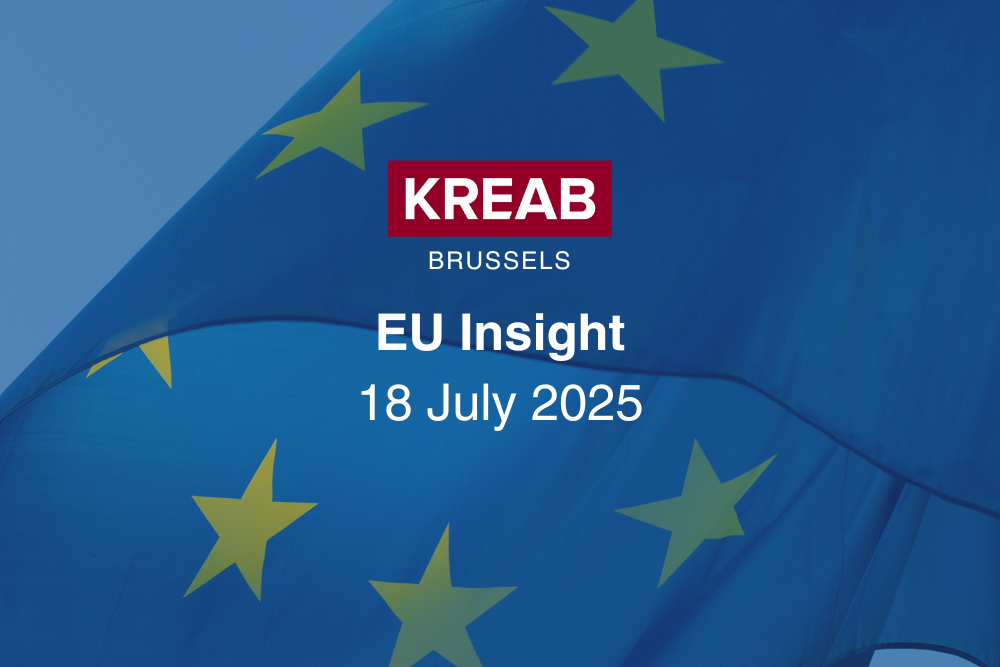
18/07/2025
EU Insight 18 July 2025
Brussels, 18 July 2025
COMMISSION €2 TRILLION 2028-2034 BUDGET FACED WITH IMMEDIATE CRITICISM
After much anticipation, the Commission presented its proposal for the EU’s new long-term budget, known as the Multiannual Financial Framework (MFF). The new budget plan which will cover the time period 2028-2034, totals up to almost €2 trillion, increasing from the €1.2 trillion which had been earmarked for the current budget. Apart said increase, the new framework features a new €234 billion Competitiveness Fund, a revamping of the EU’s Common Agricultural Policy (CAP) and proposals for new EU-level taxes, including ones on tobacco, e-waste and large companies. This latter proposal, the revision and reduction of the CAP budget, as well as the increase in budget are some of the elements at the centre of the early criticism of the suggested budget, with notably the German Chancellor voicing strong dissatisfaction.
EUROPEAN COMPETITIVENESS FUND SET TO REIGNITE EU GLOBAL LEADERSHIP
A cornerstone of the Commission’s proposal for the upcoming EU budget is the newly announced European Competitiveness Fund. By consolidating 14 existing funding instruments into a single €234 billion platform, the fund is meant to be one of the Commission’s tools to close the investment gap vis a vis global rivals and foster the EU’s economic competitiveness. Structured in six chapters, the Fund would provide financing for strategic technologies and sectors crucial for European growth. Targeting clean energy, digital, biotech, and defence, the fund’s aim is to crowd in additional private and national investment, to support EU businesses. As with the broader MFF, before its creation the fund will have to now be negotiated in Parliament and Council.
COUNCIL APPROVES 18th SANCTIONS PACKAGE AGAINST RUSSIA
Member States approved the 18th sanctions package against Russia, after weeks of negotiations following the lifting of Slovakia’s veto. This latest package notably makes the cap dynamic setting it at 15% below market prices, thus essentially bringing the cap down from $60 to $47.6 per barrel. The new package also permanently bans gas flows through the Nord Stream 1 and 2 pipelines, sanctions an additional 105 vessels of Russia’s oil tanker shadow fleet, and further limits Russian Banks’ access to western finances. Notably, Slovakia lifted its veto, after receiving assurances from the Commission on the introduction of mitigating measures to potential negative impacts on Slovakia’s economy resulting from the Commission’s parallel plans to phaseout Russian gas, which are currently under negotiation.
COUNCIL SIGNS OFF ON TWO-YEAR EXTENSION OF EU GAS STORAGE MANDATE
EU energy ministers have formally endorsed the extension of the emergency gas storage rules until December 2027. The rules require Member States to fill their gas reserves to least 90% full ahead of each winter and were first introduced as part of the 2022 energy crisis measures. The regulation, which was set to expire at the end of the year, was extended due to continued market uncertainty after Russia’s invasion of Ukraine. Notably, the extension also brings in greater leeway for Member States to comply with the requirement, allowing a greater timeframe for the storage filling target to be met as well as providing flexibility as regards the target in times of crises or unfavourable market conditions.
COUNCIL ENDORSES BATTERY DUE DILIGENCE DEADLINE DEFERRAL TO 2027
The Council signed off on the delay to the application of the due diligence requirements for battery producers by two years, now setting the deadline for 18 August 2027. For context, under the Battery Regulation, manufacturers must implement, audit, and publicly report on their due diligence policies to mitigate adverse impacts throughout their chain of activities. The delay which is part of the fourth Omnibus simplification package and the broader regulatory simplification agenda, should thus provide respite for in-scope companies, giving them more time to prepare compliance while also allowing additional time for the establishment of third-party verification bodies. With Council’s endorsement, the delay will officially apply, once the text is published in the EU’s Official Journal.
COMING UP NEXT WEEK
- Tuesday 22 July: Informal meeting of justice and home affairs ministers
- Wednesday 23 July: Informal meeting of justice and home affairs ministers: simplification on General Data Protection Regulation (GDPR)
- Wednesday 23 July: Ad Hoc Working Party on the Multiannual Financial Framework
The EU Insight will return after the summer break.

Did you like this article? Contact us to hear more about Kreab Brussels’ practice and services.

